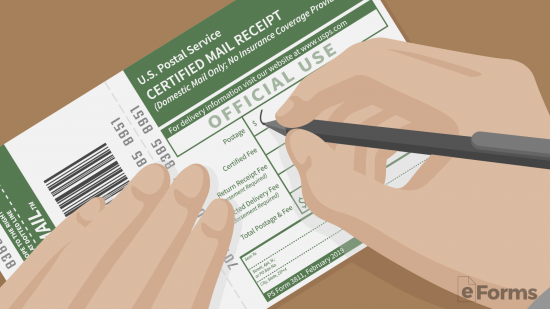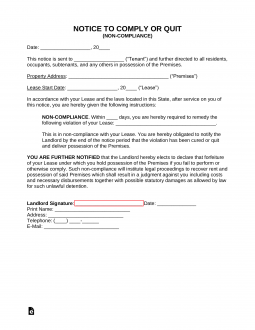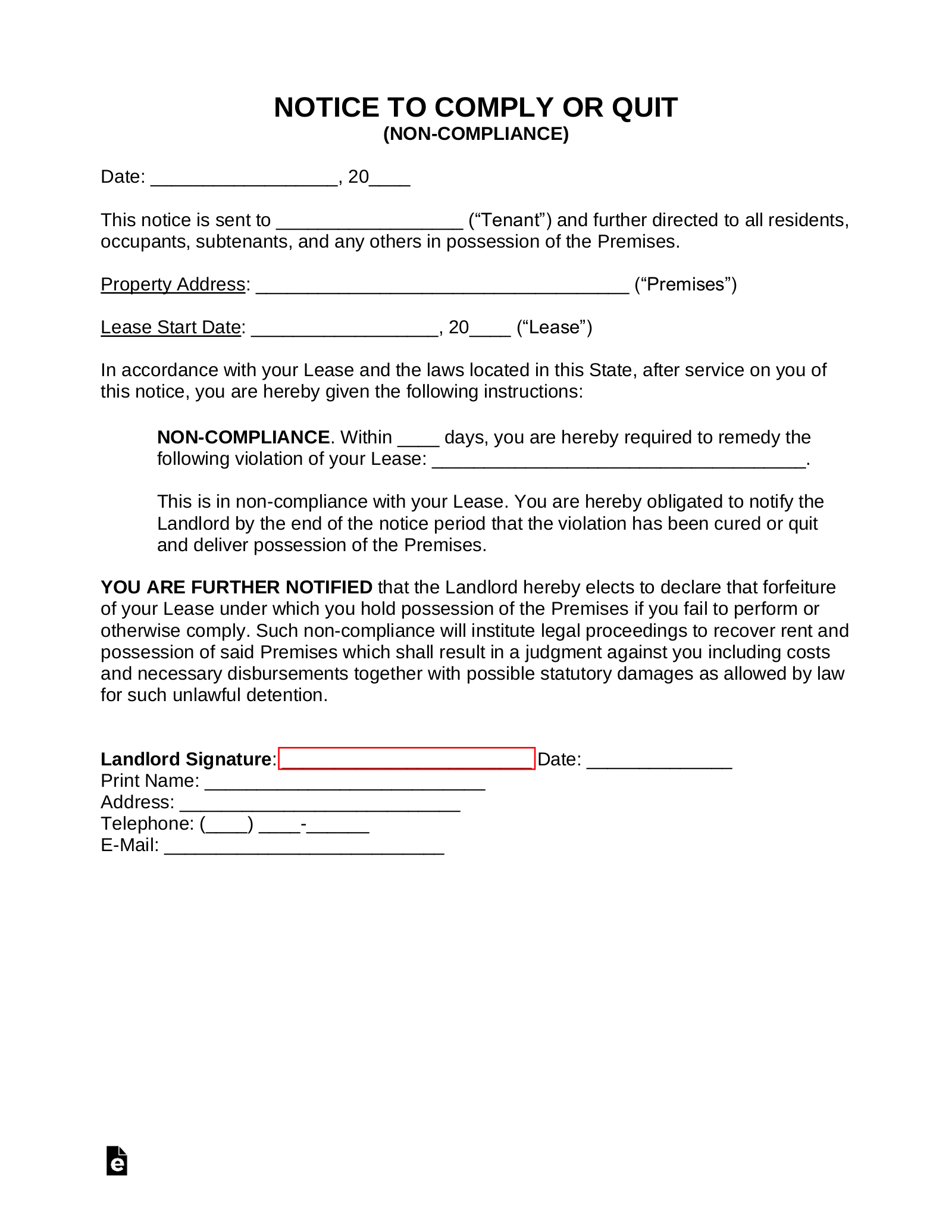Updated February 19, 2024
A notice to comply or vacate is sent by a landlord when a tenant commits a lease violation other than late rent. Once the tenant receives notice, the violation must be fixed within the state timeframe or move out of the premises. If fixed, the lease will continue as if no violation occurred.
Common Violations
- Illegal activity
- Property damage
- Loud noise
- Long-term guests
- Smoking
- Unauthorized pets
By State
- Alabama
- Alaska
- Arizona
- Arkansas
- California
- Colorado
- Connecticut
- Delaware
- Florida
- Georgia
- Hawaii
- Idaho
- Illinois
- Indiana
- Iowa
- Kansas
- Kentucky
- Louisiana
- Maine
- Maryland
- Massachusetts
- Michigan
- Minnesota
- Mississippi
- Missouri
- Montana
- Nebraska
- Nevada
- New Hampshire
- New Jersey
- New Mexico
- New York
- North Carolina
- North Dakota
- Ohio
- Oklahoma
- Oregon
- Pennsylvania
- Rhode Island
- South Carolina
- South Dakota
- Tennessee
- Texas
- Utah
- Vermont
- Virginia
- Washington
- West Virginia
- Wisconsin
- Wyoming
Table of Contents |
What is a Notice to Comply or Quit?
A notice to comply or quit informs a tenant that they have violated their lease agreement for an act unrelated to rent. If the tenant does not fix (“cure”) the issue within a specific time frame (See State Laws) then they will be required to vacate and move out of the property.
Types of Non-Compliance – Examples
- Long-term “guests” have been identified.
- Property damage is found, which can include smoking.
- The tenants have unauthorized animals on the property.
- The tenant has failed to maintain the minimum upkeep of the property.
- Multiple disturbance complaints have been filed against the tenant.
- The tenant has subleased the property without the authorization of the landlord.
- The maximum occupancy has exceeded the rental contract or as permittable by local housing laws.
- The tenant has failed to follow the regulations and rules preset by the local Homeowners Association
What about Illegal Activity?
For any tenant found breaking the law the Illegal Activity Notice to Quit must be used.
How to Serve Notice for Non-Compliance (4 steps)
- Download and Complete the Notice
- Send the Notice to the Tenant
- Speak with the Tenant
- Perform an Inspection
1. Download and Complete the Notice

Download: PDF, MS Word, OpenDocument
A proper Notice to Quit should identify the following information:
- Landlord and tenant details;
- Original lease date (for reference);
- Notice period (see State laws);
- A violation described, in full, and how to fix;
- Landlord’s/Agent’s Signature; and
- Certificate of Service to be completed by the sender.
2. Send the Notice to the Tenant

It’s recommended that any eviction notice is sent via Certified Letter (with return receipt) via USPS. This will prove that someone at the residence received the letter by their signature upon delivery. Most States allow any resident of the property age 14 years and older to accept an eviction notice.
4. Perform an Inspection

Whether the violation was property damage or an unwelcome guest living on the property, the landlord should perform an inspection. This should be performed after the notice period ends and the landlord has given proper notice for entry. It’s always recommended, no matter the State, to provide at least 48-hour notice.
At the inspection, the landlord can verify to see if the tenant has cured the issue. If not, the tenant will be required to vacate the premises immediately. If the tenant refuses to move out, the landlord may begin eviction proceedings.
When Does an Eviction Start?
An eviction starts the day after the notice period ends. If the tenant has not cured the violation or moved out of the property, the landlord may file a Complaint and Summons to their local housing court. Experienced managers can process an eviction themselves without an attorney.
It’s a fairly straightforward process anywhere from 30 to 120 days which commonly ends with the local Sheriff changing the keys. Once the keys are changed the tenant will have a certain time period to move their possessions or they become the property of the landlord.
State Laws (Required Notice Periods)
| State | Notice Period for Non-Compliance | Statute |
| Alabama | 7 days | § 35-9A-421) |
| Alaska | 10 days | § 34.03.220(a)(2) |
| Arizona | 10 days | § 33-1368(A) |
| Arkansas | 14 days | § 18-60-304 |
| California | 3 days | § 1161(3) |
| Colorado | 10 days | § 13-40-104 |
| Connecticut | 15 days | § 47a-15(a) |
| Delaware | 7 days | § 5513 |
| Florida | 7 days | § 83.56(2) |
| Georgia | N/A | No statute |
| Hawaii | 10 days | § 521-72 |
| Idaho | 3 days | § 6-303(3) |
| Illinois | 3 days | § 735 ILCS 5/9-210 |
| Indiana | N/A | No statute |
| Iowa | 7 days | § 562A.27(1) |
| Kansas | *14 days | *§ 58-2564 |
| Kentucky | 15 days | § 383.660(1) |
| Louisiana | 5 days | § 4701 |
| Maine | 7 days | § 6002 & § 6025 |
| Maryland | 30 days | § 402.1(a)(1) |
| Massachusetts | N/A | No statute |
| Michigan | 7 days | § 600.5714 |
| Minnesota | N/A | No statute |
| Mississippi | 30 days | § 89-8-13 |
| Missouri | 10 days | § 441.040 |
| Montana | 14 days | § 70-24-422 |
| Nebraska | *14 days | § 76-1431(1)) |
| Nevada | *3 days | *§ 40.2516 |
| New Hampshire | 30 days | § 540:3(II) |
| New Jersey | 30 days | § 2A:18-61.2 |
| New Mexico | 7 days | § 47-8-33A |
| New York | 10 days | § 753(4) |
| North Carolina | Immediate | § 42-26 |
| North Dakota | 3 days | § 47-32-02 |
| Ohio | 3 days | § 1923.04 |
| Oklahoma | 15 days | § 132(B) |
| Oregon | 14/10 days | § 90.392 |
| Pennsylvania | N/A | No statute |
| Rhode Island | 20 days | § 34-18-36 |
| South Carolina | 14 days | § 27-40-710(a) |
| South Dakota | Before the end of the rental contract | § 43-32-18 |
| Tennessee | 30 days | § 66-7-109 |
| Texas | N/A | No statute |
| Utah | 3 days | § 78B-6-802 |
| Vermont | 30 days | § 4467 |
| Virginia | *21 days | *§ 55.1-1245(A) |
| Washington | 10 days | § 59.12.030(4) |
| Washington D.C. | 30 days | § 42–3505.01(b) |
| West Virginia | Immediate | § 55-3A-1 |
| Wisconsin | Dependent on term | § 704.17 |
| Wyoming | 3 days | § 1-21-1003 |



